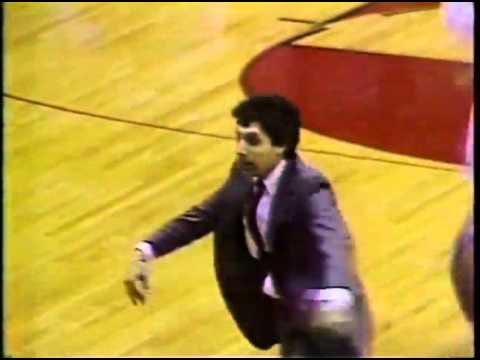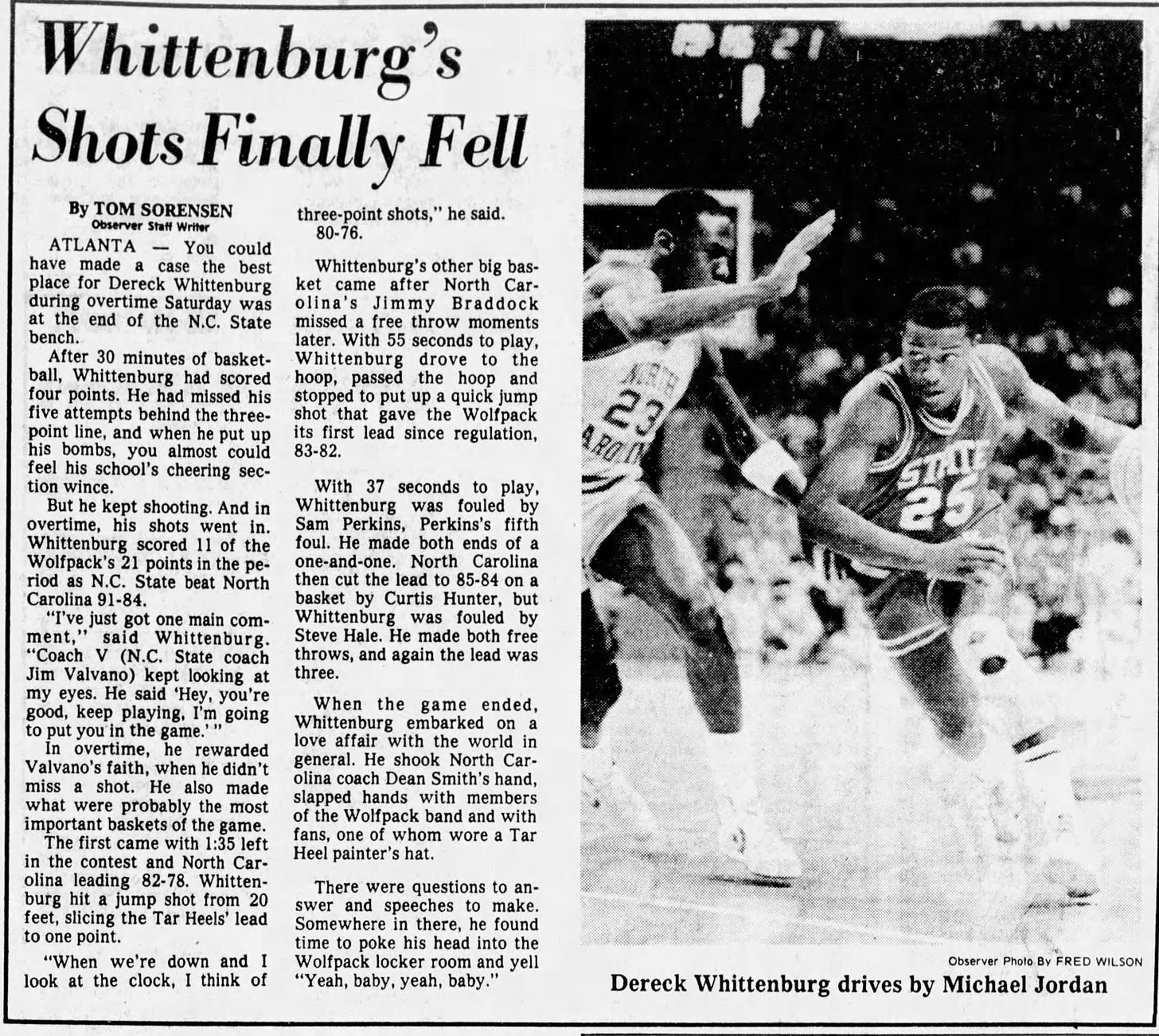From Lorenzo Charles to DJ Burns: NC State Basketball and The Unofficial Birth of March Madness
North Carolina State heads to a Final Four, played in a Southwestern city in a state welcomed into the union in 1912, where the Wolfpack will be massive underdogs opposite an all-time great center.
This certainly describes NC State’s situation when it embarks on the Phoenix area for the 2024 Final Four, squaring off against Zach Edey and Purdue. But the above also details the circumstances of the program’s last national championship, won in 1983.
NC State’s return to the Final Four 41 years later shares other noteworthy parallels, each actually beginning before the Big Dance.
The 2024 Wolfpack arguably faced a higher degree of difficulty, needing five wins in the ACC Tournament to the ‘83 Pack’s three.
However, NC State knocked off a Michael Jordan-led and reigning national champion North Carolina in the 1983 ACC semifinals, scoring 21 points in overtime behind Dereck Whittenburg.
NC State followed it up the next night by knocking off a Virginia squad featuring Ralph Sampson, 81-78. In the span of consecutive days, the Wolfpack beat teams with one of the best college players ever and the best player of a generation — if not more.
So, it’s fair to deem 1983 and 2024 a wash. DJ Burns and Co. getting a crack at the (almost inevitably) first repeat recipient of the Naismith Award since Ralph Sampson, Zach Edey, feels downright serendipitous in this context.
Indeed, the similarities between the two Wolfpack teams run deep. And it’s on that NC State championship that the identity of today’s NCAA Tournament was established.
For the longest time in my burgeoning basketball fandom, 1983 was The First NCAA Tournament — or, perhaps more accurately The First March Madness.
‘83 wasn’t the postseason in which the field expanded to 64 teams — that was 1985.
And the first Tournament to extend multiple bids to a single conference was 10 years before that, in 1975, immediately following NC State’s first national championship.
At-large spots for conference runners-up proved game-changing for the make-up of the NCAA Tournament.
But it wouldn’t necessarily be accurate to suggest the 1983 Final Four was the first to demonstrate the potential of an expanded field in terms of shaking up the championship scene.
A 1980 Final Four bereft of No. 1 seeds included the Pac-10’s fourth-place UCLA Bruins — which beat Clemson in its last Elite Eight before this year’s; and the Big Ten’s third-and-fourth-placed teams.
Coincidentally, that includes Purdue in its last Final Four before the 2024 edition. The Front Porch has more on that wild ride for the Boilermakers.
The 1983 national championship specifically and that spring’s Tournament overall may not necessarily have that one tidbit that separates it definitively as the spiritual launch of March Madness. It’s an entirely vibes-based distinction.
What is March Madness if not built on vibes, though? And the ‘83 Pack provided the ultimate in vibes.
Lorenzo Charles’ game-winning dunk at the buzzer to lift the unlikely Wolfpack past Hakeem Olajuwon, Clyde Drexler and the juggernaut Houston Cougars for years provided the introductory visual to the CBS telecast intro; Billy Packer’s call of “They won it! On the dunk!” accompanied the opening chords of that iconic theme music.
And, as a young basketball fan consuming as much as I could in 1993, Jim Valvano’s frantic search for someone to hug in celebration was replayed over and over — not in recognition of the 10-year anniversary of NC State winning the national championship, sadly, but in commemoration of Valvano’s emotional speech at that year’s ESPYs.
NC State’s two most recognizable personalities from the 1983 championship not being present for the 2024 Wolfpack’s unlikely Final Four return is sad, but their legacies endure as two of the most important in creating this cultural phenomenon.
The late Charles played all of 36 games for the Atlanta Hawks in the 1985-86 NBA season. His college career was outstanding without his put-back dunk in Albuquerque. He was named All-ACC twice, after all.
But his time in the ACC overlapped with such peers as Sam Perkins and Michael Jordan; Len Bias; Mark Price; Johnny Dawkins. His accomplishments could easily be forgotten to history, along with the countless other great college players who are perhaps a tier below All-American level and who never go on to have standout NBA careers.
However, Charles soared to heights of hardwood immortality rivaling contemporaries like Ralph Sampson and even Michael Jordan.
Yeah, Jordan obviously went onto unprecedented success and notoriety, achieving a level of global fame placing him among the single-most recognizable figures of both sports and entertainment of the last half-century.
But in terms of March Madness lore, Charles’ dunk is every bit as famous as any moment from Jordan’s time at North Carolina, including MJ’s own championship game-winning basket in 1982.
And it’s in that sense that NC State’s 1983 championship stands to me as the official pillar to what we know today as March Madness.
The NCAA Tournament is an event built around crowning a champion, sure.
If the sole purpose was to award a title, however, the format that existed before 1975 would remain in tact: A smaller field, no conference runners-up, only the most highly ranked independents invited.
What’s more, the NCAA Tournament wouldn’t be March Madness if its lone intention was determining a true champion or best team, whatever that means. One could argue the College Football Playoff more closely followed that pursuit, and its first decade proved remarkably more forgettable than any stretch of the NCAA Tournament in the nearly 50 years since expansion.
March Madness, on the other hand, is founded on making memories and immortalizing legends. Like Lorenzo Charles before him, DJ Burns can become an icon remembered for generations regardless how the rest of his basketball career turns out.
These are the qualities that separate March Madness as the premier postseason spectacle, all encapsulated in NC State and the 1983 NCAA Tournament.
The only trait from ‘83 that didn’t endure, however, is "One Shining Moment” replacing Christopher Cross’ “All Right” as the concluding theme song. How different would the conclusion of each Tournament feel had it committed to a Yacht Rock classic instead of embracing the R&B tune we all know today?





